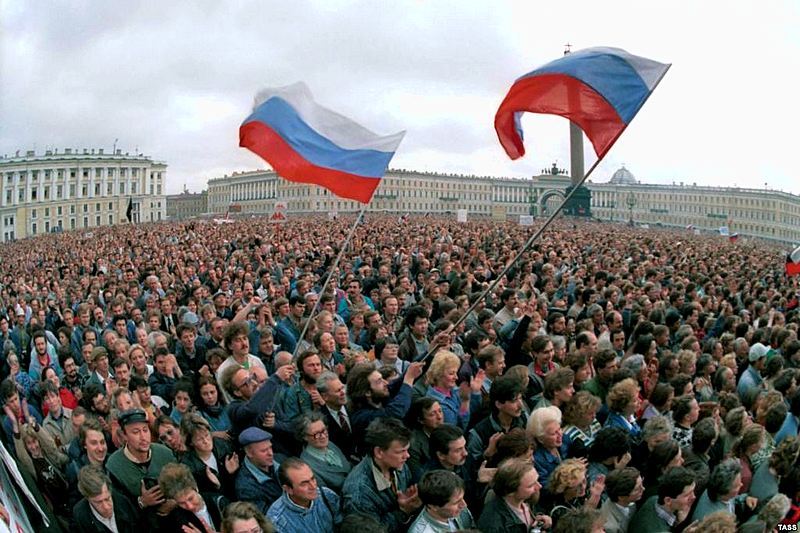Leningrad under Gorbachev: Perestroika and the fall of Communism (1984-1991)
For all its limitations and repressions, the Brezhnev era had been one of relative stability in St. Petersburg/Leningrad's tumultuous 20th century. By the mid-1980s, however, it was becoming increasingly clear that the Soviet system was economically and politically unsustainable.

The befuddled Brezhnev, who had become addicted to sleeping pills and was smoking and drinking heavily, died of a heart attack in November 1982 at the age of seventy-five. He was followed in rapid succession by the sixty-eight-year-old KGB boss Yuri Andropov, who died in 1984, and the seventy-two year old Konstantin Chernenko who passed away on 11 March 1986. Thus ended the era of ailing, aged leaders as the next man to take the helm was a relatively unknown member of the Politburo, a spritely fifty-four year old named Mikhail Gorbachev.

On 17 May 1985, the new General Secretary gave a speech at Leningrad's Communist Party headquarters which was televised nationwide: Gorbachev did not recite the worn Communist homilies of previous leaders, but admitted that in past decades, the country's performance had been sub-standard and openly mentioned problems permeating Soviet economy. He pledged to introduce policies to correct past mistakes, saying, "We have to travel a long road now but in a short space of time." The era of glasnost (openness) and perestroika (restructuring) had begun.
As part of glasnost, censorship was eased and suddenly a country in which information had been suppressed for decades was overwhelmed by a flood of political, literary, and cultural works. Millions of Soviet citizens were reading things that a few years earlier would have constituted a criminal offense. Lines to newspaper kiosks sometimes stretched around the block, and daily print runs often sold out in hours. Television stations aired programs that were astounding in their openess and political passion. These were heady days.

And Leningrad rock-and-roll flourished. One of its most iconic figures was Victor Tsoi, songwriter and lead singer of the band Kino. Tsoi, a native Leningrader of part-Korean descent, had founded Kino back in the days of the Leningrad Rock Club and now used the freer political climate to address the nation's youth, telling them to take control and confirming in his lyrics that "we want change". Tragically, while returning to Leningrad after a fishing trip in August 1990, Tsoi lost control of his car and crashed into a bus. The charismatic rock hero, who sang‚ "our eyes are looking ahead", died instantly.
Meanwhile, the country was also crashing as Gorbachev's ambitious reforms, conceived to repair and improve the existing political and economic structures actually caused them to implode. Discontent ran rampant, and a group of high ranking political hardliners, nicknamed the Gang of Eight, thought to seize the moment.

On 20 August 1991, Gorbachev, vacationing in the sunny Crimea, was placed under "dacha arrest". The Gang declared him ill and unable to govern and imposed emergency rule that banned strikes and demonstrations, limited political activities, and tightened censorship. Preparations were undertaken to ensure success: 250,000 pairs of handcuffs were made ready in Moscow. But the Gang had not thought to detain Boris Yeltsin. Climbing atop a tank in front of Moscow's White House, where enormous crowds of protesting citizens had gathered, Yeltsin rallied the country to defy the putchists and demanded a general strike, telling the military troops assembled that "You have taken an oath to your people and your weapons cannot be turned against them." Likewise, Leningrad's newly elected mayor, Anatoly Sobchak, called for a demonstration in Palace Square. It became clear that Leningrad had little empathy for the Putschists when 200,000 people came out in protest. Within hours, the putsch had collapsed and the Gang of Eight was arrested, but it was a turning point in Soviet history, signalling the symbolic end of Gorbachev's reign, whose authority was badly damaged, and the beginning of Yeltsin's, who had presented himself as a powerful force for democracy and change.

Shortly after the coup, the citizens of Leningrad voted to change the name of their city for the third time in the twentieth century. Leningrad no longer existed. The city's new name was once again St. Petersburg. On 25 December 1991, Gorbachev, swept away by the tidal forces he had unleashed, resigned, and the Soviet Union likewise ceased to exist. The next day, the white-blue-and-red striped flag of the Russian Federation was raised across the country.

